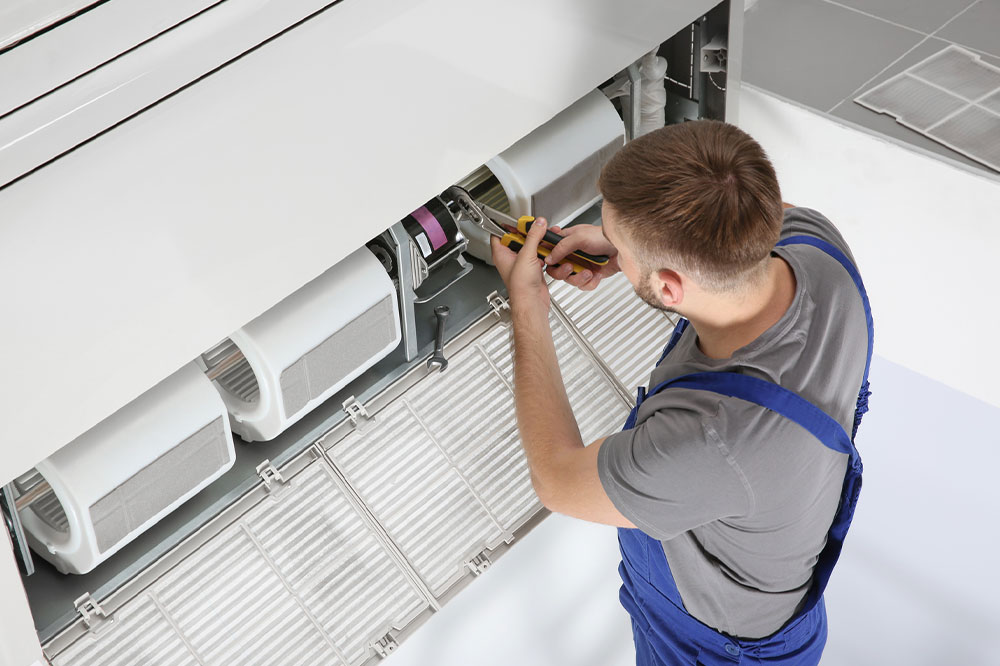Dos and Don’ts to Remember for Optimal HVAC Maintenance

A room may have the most extravagant decor and design, but it becomes habitable only with proper ventilation. According to research, pollution concentrations are typically 2–5 times higher indoors than outdoors. Heating, ventilation, and air conditioning (HVAC) is the process incorporating the use of different advanced technologies to regulate a room’s overall temperature and humidity. Here are some do’s and don’ts you must consider for maintaining the HVAC at your home or workplace.
Do’s of HVAC maintenance
Clean the air ducts every 2 – 3 years
Prevention is always better than cure — it helps to have your air ducts cleaned at least once in three years to prevent potential maintenance issues. Moreover, cleaning your air ducts frequently ensures energy efficiency and reduces your electricity charges. Finally, frequent air-duct cleaning is recommended if your children are prone to allergies or you have pets at home.
Opt for a yearly professional evaluation
While you may be adept at handling your appliances, a professional can better detect any existing or potential maintenance issues. Hence, it helps to have your HVAC system checked by an HVAC technician at least once a year. It is particularly important to have your system tested before the onset of extreme seasons or weather conditions.
Check your HVAC electrical connections and volts
Your HVAC system requires routine checkups, particularly regarding the electrical connections and volts/amps. Once in 3–4 months, check whether all the electrical connections are functioning optimally — assess the fuse boxes, fuel, switches, and batteries for any undiagnosed issues and seek professional assistance if you detect any possible malfunctions.
Check your system’s refrigerant charge
Your system’s refrigerant plays an integral role in absorbing heat from the cooling chamber. Every system has a refrigerant charge level indicated by the manufacturer. Maintaining the charge is essential to ensure the optimal functioning of the system. Consequently, a low refrigerant charge is a cause of concern and should be notified to a professional immediately. Ensure to keep an eye out for symptoms of low refrigerant charge, including longer-than-usual cooling cycles, freezing of refrigerant lines, lack of cool air, and increased energy bills.
Take steps toward an energy-efficient existence
Energy efficiency helps you save on your electricity bills and facilitates a more sustainable existence. You can ensure energy efficiency at your home or workplace through various small but significant steps, including installing a programmable thermostat, setting up double-panel windows instead of single-panel ones, installing additional attic insulation, setting up solar panels, and organizing energy efficiency audits.
The don’ts of HVAC maintenance
Don’t delay professional checks and maintenance
Your HVAC system may be brand new and well-functioning, but regular professional checks and maintenance processes are a must as they help detect and fix any potential issues. Contact an HVAC professional who has considerable experience and a good reputation. Thoroughly research contractors before finalizing one for your HVAC maintenance needs.
Don’t exclude the condenser from the cleaning process
Condensers are often resilient to dust and are typically overlooked in the cleaning process. However, over time, your AC’s condenser can also collect dust and is subject to wear and tear caused by foreign entities such as twigs and debris. Repairing the AC condenser can be an exorbitant affair and should be avoided. Ensure to clean your AC’s condenser at least once a year, trimming any plants growing around it so that they do not block the condenser.
Don’t use acidic cleaners on coils
Several home and office owners use acidic cleaners on HVAC coils for best results. However, these coils are typically not resilient to withstand acidic substances and may eventually corrode. Thus, it is important to avoid using harsh chemicals on your HVAC coils. Instead, gently pour some water on the coils using a hose and scrub them with a coil brush. This cleaning process is sure to remove any dust or debris collected in them.
Don’t neglect the AC filter
Over time, your air conditioner’s filter can collect dust, debris, and mildew. A dirty AC filter is at the core of several AC issues, increasing your electricity bills and compromising the air quality of your home or office. Consequently, it is advisable to clean your air conditioner’s filter every month and get it changed if it is not functioning optimally.
Don’t book a contractor based on price alone
Although checking the prices quoted by different contractors is an essential aspect of hiring a contractor for HVAC maintenance, it should not be the only determining factor. Sometimes, the maintenance quality is significantly compromised by contractors charging lower rates. It helps to conduct thorough research before hiring a contractor, read online reviews, discuss the detailed process, and consult your neighbors and other individuals on the best contractors available.
Don’t place heating appliances near the thermostat
Setting up your thermostat at a place that receives direct sunlight or placing heating appliances like portable heaters near it can cause your thermostat to perceive a higher temperature. Thus, it may end up cooling the room more than required, causing a wastage of energy. Thus, it is advisable to place your thermostat away from direct sunlight and avoid placing heaters around it.
HVAC maintenance is essential in various ways — it helps ensure energy efficiency, maintain a sustainable environment, and increase overall comfort in the room. Although some individuals may be more technologically inclined with an in-depth understanding of HVAC mechanisms, seeking professional guidance regularly is critical to maintaining your HVAC system. It is also crucial to act upon any issues immediately to prevent them from aggravating and causing lofty maintenance expenditures. In-depth research on the available contractors, regular maintenance checks, and simple steps to ensure energy efficiency can go a long way in terms of HVAC maintenance.






